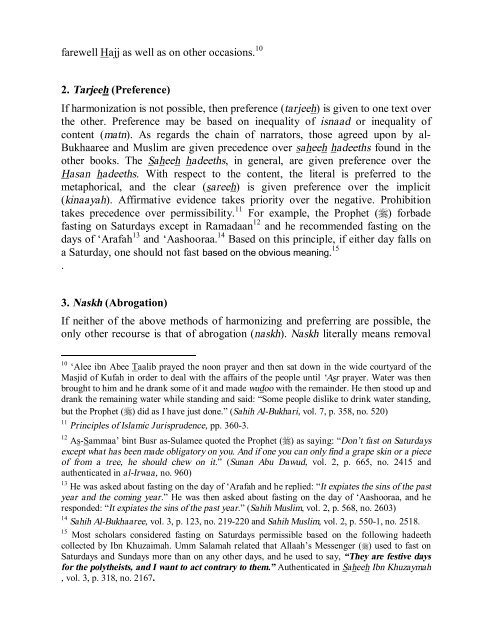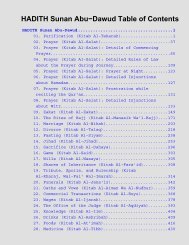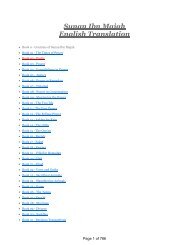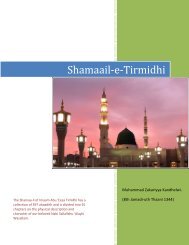sunnah prayer of Fajr after the Fard. 3 The first set of hadeeths are taken as agener<strong>al</strong> prohibition of unspecified voluntary prayers, while the second set aretaken as specified voluntary prayers which may be done at the prohibited times.If there is a contradiction between the Prophet’s statement and his actions, thegener<strong>al</strong> principle is to give preference to his statement over his action because hisact may have been specific to himself. For example, the Prophet (r) forbade hisfollowers from twenty-four hour fasts (wisa<strong>al</strong>) 4 but was recorded to have done sohimself. He told his followers who had more than four wives to choose four anddivorce the remainder 5 while he, himself, was married to nine wives at the sametime. 6 Sometimes his actions clarified the permissibility of certain acts. Forexample, ‘Aa’ishah related that the Prophet (r) never urinated standing. 7However, another Companion, Huthayfah, reported that while on a journey withthe Prophet (r), he observed him go to a village’s dump and urinate standing. 8 Orit may indicate that his statement regarding the prohibition of an act was meant toindicate great dislike and not absolute prohibition. As in the case of hisprohibiting drinking standing 9 only to openly drink Zamzam standing during his“O daughter of Aboo Umayyah, you asked about the praying of two units of prayer after theafternoon prayer. In fact, some people from the ‘Abul-Qays clan had come to me with the newsthat their people had embraced Islaam. They hindered me from praying the two units after thenoon prayer. It is those two units.” (Sunan Abu Dawud, vol. 1, p. 334-5, no. 1268 andauthenticated in Saheeh Sunan Abee Daawood,)3 Qays ibn ‘Amr said: Allaah’s Messenger (r) saw a person praying after the congregation<strong>al</strong>prayer at dawn was over, so he told him: “There are only two units of Dawn Prayer.” The manreplied: I did not pray the two units before the Dawn Prayer, so I offered them now. TheMessenger of Allaah (r) remained silent. (Sunan Abu Dawud, vol. 1, p. 333, no. 1262 andauthenticated in Saheeh Sunan Abee Daawood,)4 Sahih Al-Bukhaaree, vol. 3, p. 80, no. 145 and Sahih Muslim, vol. 2, p. 535, no. 2528.5 The Prophet (r) told Gheelaan ath-Thaqafee who accepted Islaam and had ten wives, “Retainfour and divorce the rest.” (<strong>al</strong>-Muwatta, Book 29, no. 29)6 Anas said: “The Prophet (r) used to have nine wives at one time. Whenever he divided his timeamong them, he would not return to the first until nine days had passed. And, <strong>al</strong>l the wives used togather each night in the house which he was going to.” (Sahih Muslim, vol. 2, p. 747, no. 3450)7 ‘Aa’ishah said: “Do not believe anyone who tells you that Allaah’s Messenger urinated standing.He only urinated sitting.” (Sunan Ibn-i-Majah, Sunan an-Nasaa’i, and authenticated in SaheehSunan at-Tirmithee, vol. 1, p. 6, no. 11 [old ed.])8 Sunan Abu Dawud, vol. 1, p. 6, no. 22, Sunan Ibn-i-Majah, and authenticated in Saheeh Sunanat-Tirmithee, vol. 1, p. 6, no. 23 [old ed.])9 Aboo Hurayrah quoted Allaah’s Messenger (r) as saying: “None of you should drink whilestanding. If anyone forgets, he should vomit.” (Sahih Muslim, vol. 3, p. 1117, no. 5022)
farewell Hajj as well as on other occasions. 102. Tarjeeh (Preference)If harmonization is not possible, then preference (tarjeeh) is given to one text overthe other. Preference may be based on inequ<strong>al</strong>ity of isnaad or inequ<strong>al</strong>ity ofcontent (matn). As regards the chain of narrators, those agreed upon by <strong>al</strong>-Bukhaaree and Muslim are given precedence over saheeh hadeeths found in theother books. The Saheeh hadeeths, in gener<strong>al</strong>, are given preference over theHasan hadeeths. With respect to the content, the liter<strong>al</strong> is preferred to themetaphoric<strong>al</strong>, and the clear (sareeh) is given preference over the implicit(kinaayah). Affirmative evidence takes priority over the negative. Prohibitiontakes precedence over permissibility. 11 For example, the Prophet (r) forbadefasting on Saturdays except in Ramadaan 12 and he recommended fasting on thedays of ‘Arafah 13 and ‘Aashooraa. 14 Based on this principle, if either day f<strong>al</strong>ls ona Saturday, one should not fast based on the obvious meaning. 15.3. Naskh (Abrogation)If neither of the above methods of harmonizing and preferring are possible, theonly other recourse is that of abrogation (naskh). Naskh liter<strong>al</strong>ly means remov<strong>al</strong>10 ‘Alee ibn Abee Ta<strong>al</strong>ib prayed the noon prayer and then sat down in the wide courtyard of theMasjid of Kufah in order to de<strong>al</strong> with the affairs of the people until ‘Asr prayer. Water was thenbrought to him and he drank some of it and made wudoo with the remainder. He then stood up anddrank the remaining water while standing and said: “Some people dislike to drink water standing,but the Prophet (r) did as I have just done.” (Sahih Al-Bukhari, vol. 7, p. 358, no. 520)11 Principles of <strong>Islam</strong>ic Jurisprudence, pp. 360-3.12 As-Sammaa’ bint Busr as-Sulamee quoted the Prophet (r) as saying: “Don’t fast on Saturdaysexcept what has been made obligatory on you. And if one you can only find a grape skin or a pieceof from a tree, he should chew on it.” (Sunan Abu Dawud, vol. 2, p. 665, no. 2415 andauthenticated in <strong>al</strong>-Irwaa, no. 960)13 He was asked about fasting on the day of ‘Arafah and he replied: “It expiates the sins of the pastyear and the coming year.” He was then asked about fasting on the day of ‘Aashooraa, and heresponded: “It expiates the sins of the past year.” (Sahih Muslim, vol. 2, p. 568, no. 2603)14 Sahih Al-Bukhaaree, vol. 3, p. 123, no. 219-220 and Sahih Muslim, vol. 2, p. 550-1, no. 2518.15 Most scholars considered fasting on Saturdays permissible based on the following hadeethcollected by Ibn Khuzaimah. Umm S<strong>al</strong>amah related that Allaah’s Messenger (r) used to fast onSaturdays and Sundays more than on any other days, and he used to say, “They are festive daysfor the polytheists, and I want to act contrary to them.” Authenticated in Saheeh Ibn Khuzaymah, vol. 3, p. 318, no. 2167.
- Page 2:
[Usool Al Hadeeth]The Methodology o
- Page 6 and 7:
from the Prophet of his actions, sa
- Page 8 and 9:
3. LawsOne of the primary duties of
- Page 10 and 11:
authentically attributable to the P
- Page 12 and 13:
was asked which city will be conque
- Page 14 and 15:
Rahmaan, who was at that time the m
- Page 16 and 17:
centuries. They also grouped the ha
- Page 18 and 19:
Prophet's lifetime, and in the wars
- Page 20 and 21:
JAABIR IBN ‘ABDILLAAH. One of the
- Page 22 and 23:
2. ‘Ard : Reading by the Students
- Page 24 and 25:
Transmission TerminologyThe hadeeth
- Page 26 and 27:
EVOLUTION OF THE SANADTeaching the
- Page 28 and 29:
the Sahaabah had left off and began
- Page 30 and 31: In this case the Sanad is shorter b
- Page 32 and 33: The Pattern of IsnaadThe usual patt
- Page 35 and 36: Origins of the Isnaad SystemEvery t
- Page 37 and 38: FOUR: ClassificationDue to a variet
- Page 39 and 40: Hadeeth SaheehA hadeeth must meet t
- Page 41 and 42: Saheeh li GhayrihThe hadeeth saheeh
- Page 43 and 44: ecorded by others.5. Authentic hade
- Page 45 and 46: Abee Awfaa wrote to him saying that
- Page 47 and 48: Muhammad ibn Bashshaar informed us
- Page 49 and 50: Ruling on Da‘eef NarrationsSchola
- Page 51 and 52: In this narration, he deleted the c
- Page 53 and 54: called Taghleeq at-Ta‘leeq (Closi
- Page 55 and 56: The jurists (fuqahaa) generally def
- Page 57 and 58: Caesar’s emissary collected by Ah
- Page 59 and 60: Muwatta 42 with the following chain
- Page 61 and 62: Saqiyah called him Aboo Wahb al-Asa
- Page 63 and 64: Khateeb al-Baghdaadee’s book call
- Page 65 and 66: The Mu’annan is a hadeeth in whic
- Page 67 and 68: and the household of the Prophet (r
- Page 69 and 70: The supporters of each opinion fabr
- Page 71 and 72: (Soorah al-Israa, 17: 79) he said t
- Page 73 and 74: 7. Inventions for Personal Motives:
- Page 75 and 76: Zamakhasharee and ash-Shawkaanee.Li
- Page 77 and 78: definitions by other scholars are:1
- Page 79: FIVE: ConflictIn vast number of nar
- Page 83 and 84: caught) but on the fourth occasion
- Page 85 and 86: hadeeth narrations. So much so that
- Page 87 and 88: Mulaykah, 14 az-Zuhree 15 and Shu
- Page 89 and 90: them in ash-Sha‘bee’s direction
- Page 91 and 92: ased on the relative reliability of
- Page 93 and 94: Step Four: The eras of the narrator
- Page 95 and 96: ) متواتِر بِال ْمعن
- Page 97 and 98: have even claimed Ijmaa‘ (unanimi
- Page 99 and 100: What further explains this Qur’aa
- Page 101 and 102: Bukhaaree - the most correct book a
- Page 103 and 104: 3. ‘Abdullaah ibn ‘Umar said:
- Page 105 and 106: of scholars. It is false because it
- Page 107 and 108: This hadeeth was narrated from Anas
- Page 109 and 110: the view that discrepancies between
- Page 111 and 112: EIGHT: LiteratureThe origins of the
- Page 113 and 114: collected hadeeths which were relat
- Page 115 and 116: Ibn Hambal began lecturing on tradi
- Page 117 and 118: students, and also to his sons and
- Page 119 and 120: The final chapter is on Shamaa’il
- Page 121 and 122: On many occasions al-Bukhaaree’s
- Page 123 and 124: Saheeh of Muslim ibn al-Hajjaaj ibn
- Page 125 and 126: have examined 500,000 hadeeths, and
- Page 127 and 128: Islamic world. 43 Sunan Abee Daawoo
- Page 129 and 130: them on account of its isnaad. I he
- Page 131 and 132:
Muslim. 56 The book does, however,
- Page 133 and 134:
Ad-Daaraqutnee rapidly acquired a s
- Page 135 and 136:
men had to be appointed to repeat h
- Page 137 and 138:
The Zawaa’id Work of al-Haythamee
- Page 139 and 140:
(iv) They had been used as a basis
- Page 141 and 142:
the well-known Kitaab al-Ansaab of
- Page 143 and 144:
notices of more than 40,000 narrato
- Page 145 and 146:
Zaynud-Deen al-‘Iraaqee (725-806/
- Page 147 and 148:
forced to leave the city and wander
- Page 149 and 150:
the author. But the work could not
- Page 151 and 152:
TEN: Women Scholars of HadeethHisto
- Page 153 and 154:
daughter of the distinguished juris
- Page 155 and 156:
turn lectured to many students, som
- Page 157 and 158:
excelled in the art of calligraphy
- Page 159 and 160:
occurs only in Mutayyin’s narrati
- Page 161 and 162:
Abu Bakr as-Siddeeq, then to Ali ib
- Page 163 and 164:
ف َأ َمسك َها ف َل
- Page 165 and 166:
Haakim, Muhammad ibn ‘Abdillaah a
- Page 167:
Thahabee, Muhammad ibn Ahmad ath-.





